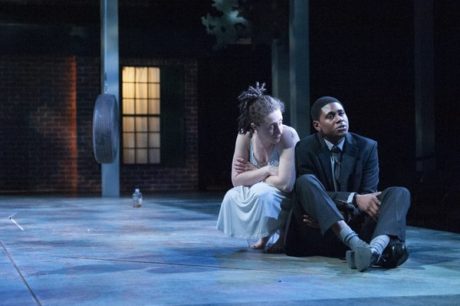Revelations are many in the admirable production of Bathsheba Doran’s The Mystery of Love & Sex currently at Signature Theatre. Directed by Stella Powell Jones, The Mystery of Love & Sex has its share of finely presented insights and nice shadings about the vagaries of living with uncertainty in one’s life whether young or old, straight or LGBT, white or black. Doran’s offering has an overall safeness about it; rather than sharp pointed transgressive demeanor. It has even provides a gentle, soft landing at the final black-out.

Doran’s The Mystery of Love & Sex explores the convolutions of identity, the arc of a long-term friendship, the search for intimate love, fears of intimacy when merely represented as sex acts as well as the struggles for survival within a crumbling marriage. All of these issues are presented against the backdrop of the current changing American cultural norms.
Specifically, The Mystery of Love & Sex delves into the long friendship of Charlotte and Jonny. They have been BFFs since early childhood. They are now entering early adulthood at some unnamed Southern college. The audience first meets them as they ready their small place for the arrival of Charlotte’s parents. The meal can only be described at what sounds like take-out from a local DC area Sweetgreen. There is even bread without butter.
Quickly the audience will discern that the friendship might blossom into romance, if not more as Charlotte (in a confidant spirited performance by Shayna Blass) takes the lead in asking questions of Jonny (a lovely layered take by Xavier Scott Evans) who is rather timid in his reactions. What is clear as the opening scene takes shape is that neither is sure about much in life.
How to describe the characters of Charlotte and Jonny in a few short sentences? Charlotte is white, half-Jewish, an entitled Daddy’s girl who likes to dance and act fearlessly in private, and may have feelings for other women.Jonny is Black, Baptist, uncertain in his mannerism and reactions, has had no father he has known in his life, says he can’t dance, and may have feelings for other men.
Soon after the audience meeting Charlotte and Jonny, the audience is introduced to Charlotte’s parents. The older couple give off the vibs of two people long-married who know each other’s button well and push them regularly. They have their own at-first attractive imbalance. She is Lucinda (Emily Townley who develops total likeability in her very appealing performance as a Charlotte’s mom and confidant). Lucinda is a sassy Southern charmer who snaps her fingers when stressed, and is rarely too direct with her brusque New York City Jewish husband and detective story writer Howard. Howard (Jess Still trying hard, but not always succeeding, with his overbearing Jewish father characterizations) is a character for whom aggressive directness is his way of life. Lucinda and Howard do share several major emotions; the deep love for their daughter Charlotte and wanting to be understanding supportive modern progressive parents.
Playwright Doran certainly has an ear for dialogue and situations. If you are not familiar with Doran she has penned episodes of the critically acclaimed HBO series Boardwalk Empire, a writer/producer for Showtime’s Master of Sex, and story editor for the sadly departed NBC series, SMASH. Her recent plays such as Nest and Kin, have received great notices. Doran studied at Cambridge and Oxford, and then came to America for studies at Columbia and Julliard.
Doran easily gets the audience attention with lines between Charlotte and Jonny as they try to sort out their feelings for each other, and try to figure out their own identities. Doran’s build of two confused characters trying to understand themselves include winning lines such as such as:
- Are we an illusion?
- I don’t know who you are?
- I have no idea what I doing. You have to help Support me.
- She is not who I am.
Sounds delicious doesn’t it? But, there is a big but for me as I write this column.
My issues with The Mystery of Love & Sex are not with the Signature production. Rather second thoughts grew as I walked out the Signature Theatre door into the night. It hit me that one character had a tremendous disadvantage in the play as scripted by Doran. It is Jonny. His depiction, not the Evans performance, gawed at me. Jonny’s life had a much slimmer backstory than Charlotte’s on-stage life. Her parents were fully alive and visible. She interacted with them. They interacted with her and Jonny.
As for Jonny, what did the audience learn of him? It came only from his conversations with the three white characters sharing the stage with him. His mother was never seen and only talked about or trotted out in conversations Jonny had with others. She even died in Act II. Jonny’s father was a no-show in his life. When he spoke of his heart-felt Christian sense of values and of Jesus and his personal struggles and demons it was with the drama of speaking to his own folk. And Jonny also had to withstand Howard regularly trying to trump Jonny’s feelings about being black and his ancestors living as slaves with comments that the Holocaust was much worse. He seems to be just a foil in Doran’s script, alone up there on stage trying to fit in – not just to who he was becoming, but in a white writer’s world view.

Perhaps overthinking as we progressives sometimes do, the characters began to seem as easy stereotypes, even if well-played. And, jeez, Charlotte even had he white Jewish grandfather make an appearance, but Jonny was all alone.
One other comment, when Charlotte is visually transgressive, she does it in private, only Jonny sees her. When playwright Doran has Jonny be visually transgressive he is in public and several characters on stage observe him. What’s with that? Jonny deserved much better.
Finally, while The Mystery of Love & Sex has a totally sweet wrap-up, I have to admit, I didn’t buy it. I wonder what Lorraine Hansberry would have written; wait just a minute, she gave us ‘theater geeks’ clues decades ago in The Sign in Sidney Brustein’s Window.
Running Time: 2 hours and 30 minutes, including an intermission.
The Mystery of Love & Sex plays through May 6, 2016 at Signature Theatre – 4200 Campbell Avenue, in Arlington, VA. For tickets, call the box office at (703) 820-9771, or purchase them online.
LINK:
Robert Michael Oliver’s 5-star review on DCMetroTheaterArts.





Thank you, David Siegel for this review. It is refreshing to read a review that so succinctly perceives and addresses the imbalances and frequent “onesidedness” in “the white writer’s world view” portrayals of this (and countless other) characters of color. It isn’t “overthinking” at all, or about being “progressive”. Kudos for voicing those lingering second thoughts that gnawed at you long into the night.